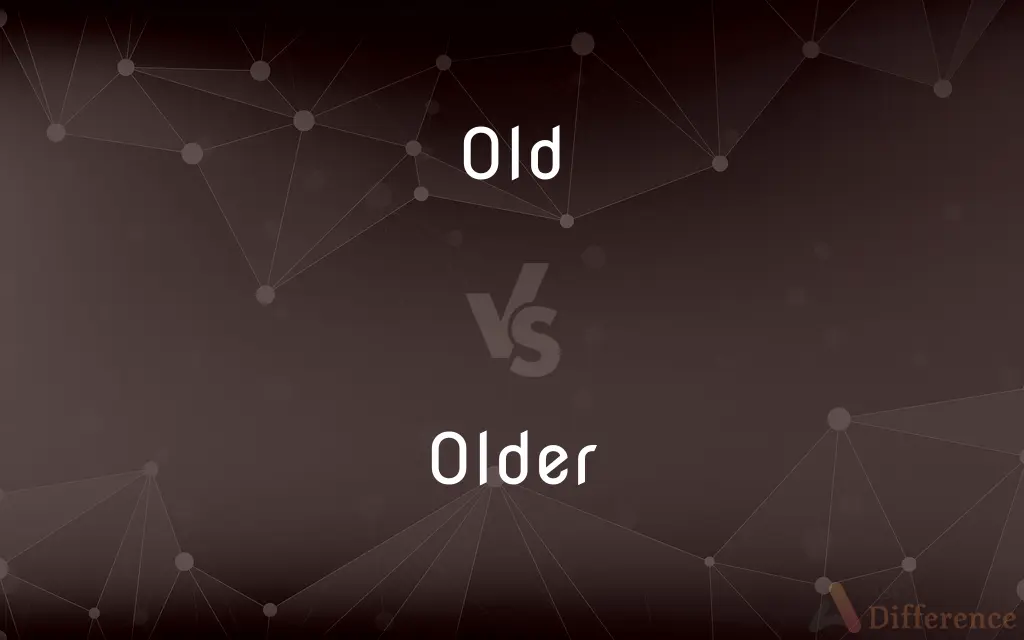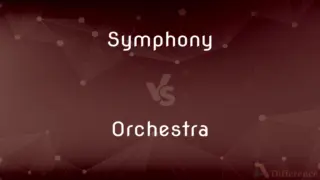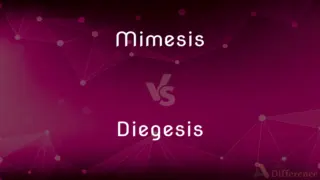Old vs. Older — What's the Difference?
By Fiza Rafique & Urooj Arif — Updated on April 16, 2024
Old refers to something that has existed for a long time, emphasizing its age; older compares two things, indicating that one is more aged than the other.

Difference Between Old and Older
Table of Contents
ADVERTISEMENT
Key Differences
The term "old" is used to describe objects, ideas, or people that have been in existence or use for a considerable period. On the other hand, "older" is used comparatively to indicate that one of two objects, ideas, or people has been around for a longer time than the other.
"Old" can describe a fixed state or quality, suggesting that the age of the item or person is significant by itself. Whereas "older" implies a relative measure, always needing a comparison to determine the degree of age.
In usage, "old" can stand alone as a descriptor, such as in "an old house". On the other hand, "older" must reference another subject or object for its usage to make sense, as in "an older house than the one next door".
The term "old" often carries connotations that can be either positive or negative, reflecting qualities like wisdom or obsolescence. Conversely, "older" is typically more neutral, primarily focusing on chronological order rather than qualitative attributes.
In terms of emotional impact, calling something "old" can evoke a sense of nostalgia or respect, but it can also imply that something is out-of-date. In contrast, "older" simply denotes that one thing predates another, without the same emotional connotations.
ADVERTISEMENT
Comparison Chart
Usage
Absolute descriptor
Comparative descriptor
Dependency
Can be used independently
Requires a comparison
Connotation
Can be positive or negative
Generally neutral
Contextual Examples
"an old tradition"
"older than the hills"
Emotional Impact
Nostalgia, respect, or obsolescence
Primarily chronological
Compare with Definitions
Old
Indicating that something is worn or faded from use or time.
She still drives her old car.
Older
Used in a familial context to indicate seniority.
She is the older sister.
Old
Referring to former or past times.
In old Japan, samurais were respected warriors.
Older
Used to compare historical periods.
The older era was marked by turmoil.
Old
Relating to something from an earlier period.
The old paintings in the museum are breathtaking.
Older
Comparatively more aged than another.
He is older than his cousin.
Old
Used to signify age.
He prefers old wines.
Older
In comparisons of possessions.
His older car is a classic now.
Old
Used in a disparaging way to suggest obsolescence.
That old method is no longer effective.
Older
Referring to the latter stages of life.
She entered her older years with grace.
Old
Having lived for a long time; no longer young
The old man lay propped up on cushions
Older
Having lived or existed for a relatively long time; far advanced in years or life.
Old
Belonging to the past; former
Valuation under the old rating system was inexact
Older
Relatively advanced in age
Pamela is our oldest child.
Old
Of a specified age
A seven-month-old baby
He was fourteetn years old
Older
Made long ago; in existence for many years
An old book.
Old
Used to express affection, familiarity, or contempt
Good old Mum
I didn't like playing with silly old dolls
Older
Of or relating to a long life or to people who have had long lives
A ripe old age.
Old
Having lived or existed for a relatively long time; far advanced in years or life.
Older
Having or exhibiting the physical characteristics of age
A prematurely old face.
Old
Relatively advanced in age
Pamela is our oldest child.
Older
Having or exhibiting the wisdom of age; mature
A child who is old for his years.
Old
Made long ago; in existence for many years
An old book.
Older
Having lived or existed for a specified length of time
She was 12 years old.
Old
Of or relating to a long life or to people who have had long lives
A ripe old age.
Older
Exhibiting the effects of time or long use; worn
An old coat.
Old
Having or exhibiting the physical characteristics of age
A prematurely old face.
Older
Known through long acquaintance; long familiar
An old friend.
Old
Having or exhibiting the wisdom of age; mature
A child who is old for his years.
Older
Skilled or able through long experience; practiced
He is an old hand at doing home repairs.
Old
Having lived or existed for a specified length of time
She was 12 years old.
Older
Belonging to a remote or former period in history; ancient
Old fossils.
Old
Exhibiting the effects of time or long use; worn
An old coat.
Older
Belonging to or being of an earlier time
Her old classmates.
Old
Known through long acquaintance; long familiar
An old friend.
Older
Often Old Being the earlier or earliest of two or more related objects, stages, versions, or periods.
Old
Skilled or able through long experience; practiced
He is an old hand at doing home repairs.
Older
Having become slower in flow and less vigorous in action. Used of a river.
Old
Belonging to a remote or former period in history; ancient
Old fossils.
Older
Having become simpler in form and of lower relief. Used of a landform.
Old
Belonging to or being of an earlier time
Her old classmates.
Older
Used as an intensive
Come back any old time. Don't give me any ol' excuse.
Old
Often Old Being the earlier or earliest of two or more related objects, stages, versions, or periods.
Older
Used to express affection or familiarity
Good ol' Sam.
Old
Having become slower in flow and less vigorous in action. Used of a river.
Older
An individual of a specified age
A five-year-old.
Old
Having become simpler in form and of lower relief. Used of a landform.
Older
Old people considered as a group. Used with the
Caring for the old.
Old
Used as an intensive
Come back any old time. Don't give me any ol' excuse.
Older
Former times; yore
In days of old.
Old
Used to express affection or familiarity
Good ol' Sam.
Older
, elder, senior
My older brother and I are Catholic twins. He’s older by eleven months, not quite a year older than me.
Old
An individual of a specified age
A five-year-old.
Older
Elderly
The thoughtful lad helped an older lady across the street.
Old
Old people considered as a group. Used with the
Caring for the old.
Older
Advanced in years; (`aged' is pronounced as two syllables);
Aged members of the society
Elderly residents could remember the construction of the first skyscraper
Senior citizen
Old
Former times; yore
In days of old.
Older
Older brother or sister;
Big sister
Old
Of an object, concept, relationship, etc., having existed for a relatively long period of time.
An old abandoned building
An old friend
Older
Used of the older of two persons of the same name especially used to distinguish a father from his son;
Bill Adams, Sr.
Old
Of a living being, having lived for most of the expected years.
A wrinkled old man
Older
Old in experience;
An old offender
The older soldiers
Old
Of a perishable item, having existed for most of, or more than, its shelf life.
An old loaf of bread
Old
Of a species or language, belonging to a lineage that is distantly related others
The ginkgo is one of the oldest living trees
Basque is the oldest language in Europe
Old
Having been used and thus no longer new or unused.
I find that an old toothbrush is good to clean the keyboard with.
Old
Having existed or lived for the specified time.
How old are they? She’s five years old and he's seven. We also have a young teen and a two-year-old child.
My great-grandfather lived to be a hundred and one years old.
Old
(heading) Of an earlier time.
Old
Former, previous.
My new car is not as good as my old one.
A school reunion for Old Etonians
Old
That is no longer in existence.
The footpath follows the route of an old railway line.
Old
Obsolete; out-of-date.
That is the old way of doing things; now we do it this way.
Old
Familiar.
When he got drunk and quarrelsome they just gave him the old heave-ho.
Old
(UK) Being a graduate or alumnus of a school, especially a public school.
Old
Tiresome after prolonged repetition.
Your constant pestering is getting old.
Old
Said of subdued colors, particularly reds, pinks and oranges, as if they had faded over time.
Old
A grammatical intensifier, often used in describing something positive, and combined with another adjective.
We're having a good old time.
My next car will be a big old SUV.
My wife makes the best little old apple pie in Texas.
Any old
Old
(obsolete) Excessive, abundant.
Old
|invariable plural only}} People who are old; old beings; the older generation, taken as a group.
A civilised society should always look after the old in the community.
Old
One's parents.
I had to sneak out to meet my girlfriend and tell the olds I was going to the library.
Old
A typically dark-coloured lager brewed by the traditional top-fermentation method.
Old
Open country.
Old
Not young; advanced far in years or life; having lived till toward the end of the ordinary term of living; as, an old man; an old age; an old horse; an old tree.
Let not old age disgrace my high desire.
The melancholy news that we grow old.
Old
Not new or fresh; not recently made or produced; having existed for a long time; as, old wine; an old friendship.
Old
Formerly existing; ancient; not modern; preceding; original; as, an old law; an old custom; an old promise.
Old
Continued in life; advanced in the course of existence; having (a certain) length of existence; - designating the age of a person or thing; as, an infant a few hours old; a cathedral centuries old.
And Pharaoh said unto Jacob, How old art thou?
Old
Long practiced; hence, skilled; experienced; cunning; as, an old offender; old in vice.
Vane, young in years, but in sage counsel old.
Old
Long cultivated; as, an old farm; old land, as opposed to new land, that is, to land lately cleared.
Old
Worn out; weakened or exhausted by use; past usefulness; as, old shoes; old clothes.
Old
More than enough; abundant.
If a man were porter of hell gate, he should have old turning the key.
Old
Aged; antiquated; hence, wanting in the mental vigor or other qualities belonging to youth; - used disparagingly as a term of reproach.
Old
Old-fashioned; wonted; customary; as of old; as, the good old times; hence, colloquially, gay; jolly.
Old
Used colloquially as a term of cordiality and familiarity.
Old
Past times (especially in the phrase `in days of old')
Old
(used especially of persons) having lived for a relatively long time or attained a specific age; especially not young; often used as a combining form to indicate an age as specified as in `a week-old baby';
An old man's eagle mind
His mother is very old
A ripe old age
How old are you?
Old
Of long duration; not new;
Old tradition
Old house
Old wine
Old country
Old friendships
Old money
Old
Of an earlier time;
His old classmates
Old
(used for emphasis) very familiar;
Good old boy
Same old story
Old
Lacking originality or spontaneity; no longer new;
Moth-eaten theories about race
Old
Just preceding something else in time or order;
The previous owner
My old house was larger
Old
Of a very early stage in development;
Old English is also called Anglo Saxon
Old High German is High German from the middle of the 9th to the end of the 11th century
Old
Old in experience;
An old offender
The older soldiers
Old
Used informally especially for emphasis;
A real honest-to-god live cowboy
Had us a high old time
Went upriver to look at a sure-enough fish wheel
Common Curiosities
Is "older" used only with living things?
No, "older" can also be used to describe objects, ideas, or places in terms of their age relative to others.
What kinds of things can be described as "old"?
Anything from physical objects like books and buildings to abstract concepts like traditions and ideas can be described as "old".
How does "older" function grammatically in a sentence?
"Older" functions as a comparative adjective, meaning it is used to compare the age of two entities.
Does "old" always imply something negative?
No, "old" can be used affectionately or respectfully, such as referring to someone as an "old friend".
Can "old" be used in a technical context?
Yes, "old" can describe outdated technology or methods, indicating they are from a previous era.
How do "old" and "older" differ in emotional impact?
"Old" may evoke a wider range of emotions, from nostalgia to disdain, while "older" typically focuses on factual age comparison.
How can "older" be used to show respect?
"Older" can denote respect when used in contexts like "an older member of the community," implying wisdom and experience.
Can "older" be used without mentioning what it is being compared to?
Typically, "older" requires a reference point, though it can be omitted if the comparison is clear from context.
What is an example of using "old" in a positive way?
Describing a book as "an old favorite" suggests positive sentiments and value.
Is "older" comparative in all its uses?
Yes, "older" inherently compares the ages of two or more subjects or objects.
Can "old" describe something that is not necessarily aged but rather out of fashion?
Yes, "old" can refer to something that is no longer in current use or style, implying it is outdated.
What does it mean when people refer to "the good old days"?
This phrase uses "old" to romanticize the past, suggesting that it was better or simpler compared to the present.
How can the use of "old" affect the perception of an object or idea?
Using "old" might either enhance the value of an object or idea by highlighting its enduring nature or diminish its relevance by suggesting it's outdated.
What are the implications of using "older" in a professional context?
In a professional context, "older" might refer to experience and seniority, often viewed positively unless implying obsolescence.
Is there a scenario where "old" and "older" can be used interchangeably?
Generally, they are not interchangeable due to "old" being absolute and "older" being comparative, but they might be used similarly in casual conversation when the context of comparison is implicitly understood.
Share Your Discovery

Previous Comparison
Symphony vs. Orchestra
Next Comparison
Mimesis vs. DiegesisAuthor Spotlight
Written by
Fiza RafiqueFiza Rafique is a skilled content writer at AskDifference.com, where she meticulously refines and enhances written pieces. Drawing from her vast editorial expertise, Fiza ensures clarity, accuracy, and precision in every article. Passionate about language, she continually seeks to elevate the quality of content for readers worldwide.
Co-written by
Urooj ArifUrooj is a skilled content writer at Ask Difference, known for her exceptional ability to simplify complex topics into engaging and informative content. With a passion for research and a flair for clear, concise writing, she consistently delivers articles that resonate with our diverse audience.











































